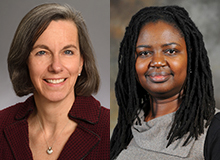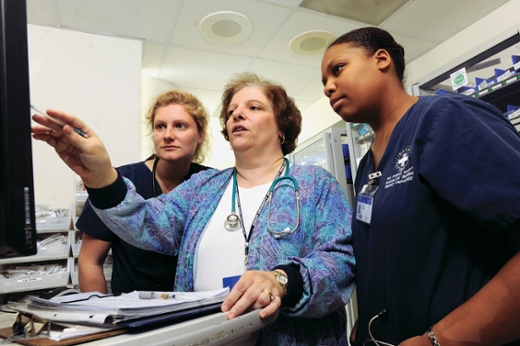Applications are now being accepted for one of 25 positions in a new 18-month fellowship program designed to help health science educators study their teaching, mentoring, leadership, or curriculum development efforts and disseminate their findings to other educators.

Linda Orkin Lewin, Ulemu Luhanga
"The fellowship in educational scholarship is not about how to teach per se but how to analyze what works best in teaching and how to present and publish findings from this research," says pediatrician Linda Orkin Lewin, who is directing the fellowship along with education researcher Ulemu Luhanga.
The fellowship begins with a kickoff event on September 12. This event, held in conjunction with a symposium focused on interprofessional education, will be open to all educators in the health sciences—not just those in the fellowship program, says Lewin. This will be followed by six once-a-month Wednesday-afternoon workshops led by national experts, from October 2018 through March 2019. Each participant then will conduct a mentored research project in their educational setting, meeting monthly in project groups over 12 months, with graduation and poster presentations slated for March 2020. On completion of the fellowship, participants will receive Medical Education Research Certification from the Association of American Medical Colleges.
The application deadline for this fellowship is April 1, says Lewin, and applicants will be notified of acceptance by April 15. "An online live-chat info session will be held at 5:00 p.m. on March 6 for those who would like to learn more about the program," says Lewin, whose own scholarship and publications have focused on teaching.
The fellowship in educational scholarship is the signature program of the Woodruff Health Educators Academy (WHEA), created in the past year to bring educators together across the health sciences center to promote and support the practice and scholarship of teaching and learning. The WHEA is led by an inter-professional Steering Committee—educators in nursing, public health, medicine (including the Physician Assistant, Physical Therapy, and Anesthesiologist Assistant programs), and the university's Center for Faculty Development and Excellence. They come from varied backgrounds, but they all share a focus on preparing the next generation of health professionals.
Nursing faculty member Elizabeth Downes, for example, is passionate about this mission. When she worked for the World Health Organization prior to coming to Emory, she developed an NP training program for small island nations that
Downes says the WHEA gives teaching in the health sciences some long-due structure and foundation. "We need to strengthen and promote the excellent work being done here around education," she says. "We do a lot that remains invisible because we don't measure and showcase what we're doing. Teaching needs the same kind of status, evidence base, and promotion track as our other missions."
WHEA Steering Committee member Jodie Guest, a professor in both public health and medicine (PA program) and a Rollins MPH and
"Currently, faculty
WHEA steering committee member Katie Monroe, who directs the Anesthesiologist Assistant Program, says she would have loved such a program early in her career before she went back to school to get a
In addition to the new fellowship, the WHEA offers quarterly lunchtime "teaching hacks," involving educators from each of the three schools and providing tips on best teaching practices. Additional programs for educators will be forthcoming as the WHEA continues to develop, says Luhanga.

